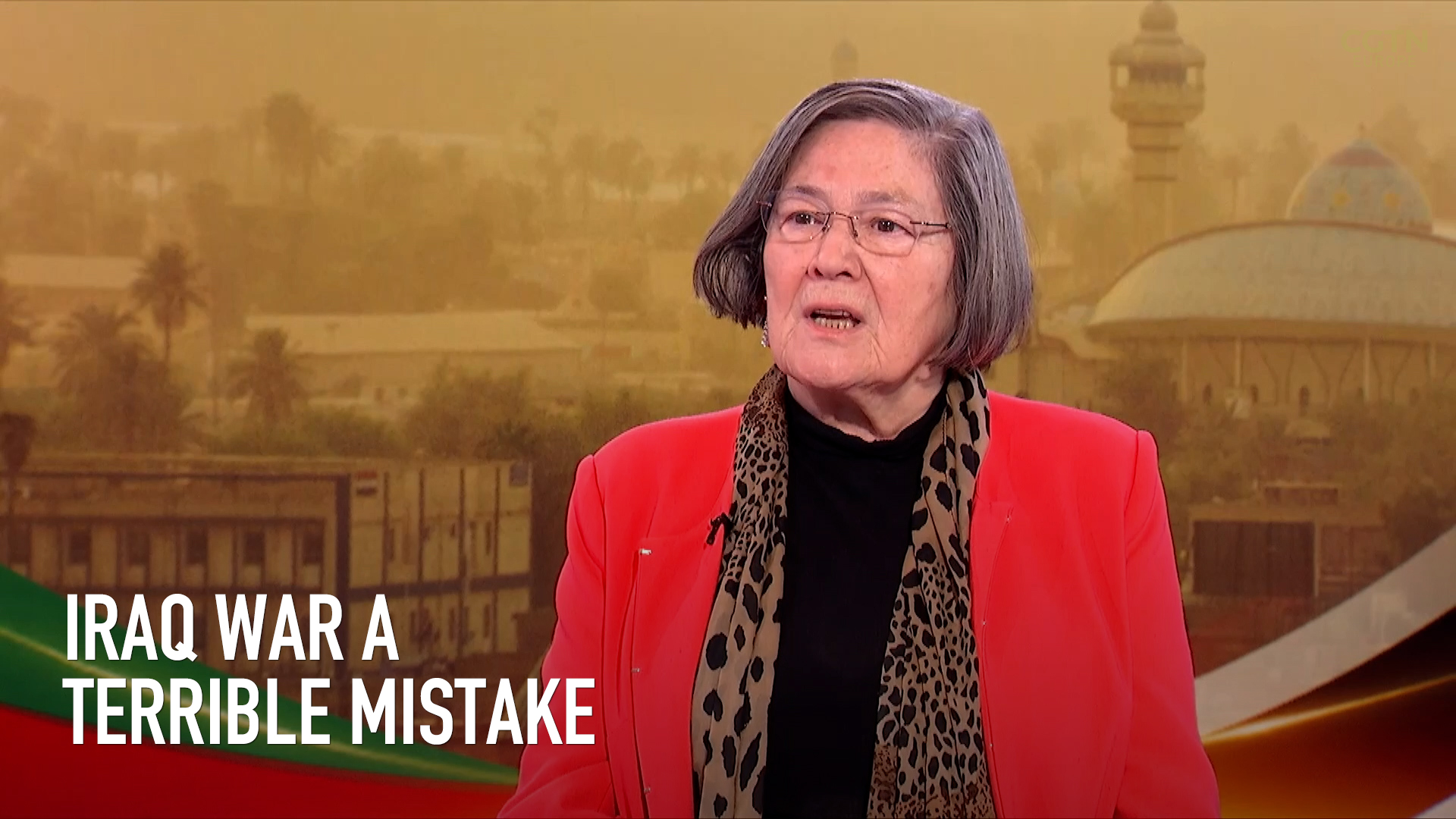04:13

The legacy of the war in Iraq has been to undermine faith in international law and institutions which has harmed millions of people all across the world, according to Clare Short, who resigned from the British government over the conflict.
Short, who had been minister for International Development as the UK prepared to join its U.S. allies in attacking Iraq, said the decision to invade without United Nations approval had consequences which are still being felt two decades on.
She was speaking to CGTN Europe in an interview to mark the twentieth anniversary of the war.
"Everyone should pause and stop and learn the lessons that military intervention... just divides the world, leads to chaos, suffering and distrust across the world. And it's not good for humanity or the people of the country that's being invaded," she told CGTN's Jamie Owen.
On March 19, 2003, Iraq's capital Baghdad was suddenly rocked by a series of explosions. Later that day, U.S. President George W Bush announced the beginning of a military invasion, beginning a bloody war that would last eight years and result in an estimated 461,000 deaths.
U.S. forces were joined by troops from the UK, Poland and Australia, as they launched a coordinated invasion and vowed to topple Iraqi leader Saddam Hussein, who they claimed possessed weapons of mass destruction (WMD).
The Iraqi military and paramilitary forces were rapidly defeated and Hussein was eventually captured and hanged in 2006. But when evidence of WMDs was proven to be misleading, a violent insurgency arose and resulted in a protracted war that lasted until 2011.
Short, who quit the British government two months after the war began, said that on balance she felt that the damage caused by the war outweighed the benefits to the Iraqi people from the overthrow of Saddam Hussein and that its negative impacts had spread far across the world.
READ MORE
Why the Fu Manchu myth still haunts the West
Explainer: How the AUKUS deal could threaten nuclear safety
Meet the Bridge Builders bringing the UK and China together
The U.S. and its allies including the UK have lost the trust of a large number of countries because of the failure to adhere to the principle that intervention in another country should only be conducted with UN approval, she said.
"What does the whole Global South say? 'Hmm, NATO – you want us to support you in the case of Ukraine, but you do what you like when you feel like it. You're just calling for international law when it suits you.'
"So that diminution of trust and respect for international law is a very serious problem for all of us, because it means more invasions, more war."
At the time of the invasion, Blair insisted the war was legitimized by Security Council resolutions. But in September 2004, the then United Nations Secretary-General Kofi Annan stated: "I have indicated that it is not in accordance with the UN charter. From our point of view and the UN Charter point of view, it [the war] was illegal."

Britain's then Prime Minister Tony Blair addresses British troops in Basra, southern Iraq, in 2003. /Pool via Reuters
Britain's then Prime Minister Tony Blair addresses British troops in Basra, southern Iraq, in 2003. /Pool via Reuters
In Short's opinion, the Iraq war marked a turning point where the world moved from a spirit of peaceful cooperation that followed the end of the Cold War to a new period of rearmament and mistrust.
"At the end of the Cold War, everyone's arms spending went down and down and down, there was talk of peace and development – and indeed, we made a lot of progress in reducing poverty across the world," she said.
"Now it's all 'Oh, we're against America' and 'We're all criticizing China' and everybody's spending more on weapons when we've got the crisis of global warming and a decline in our success in reducing poverty in the world. So we're going backwards fast."

Former Iraqi leader Saddam Hussein addresses the court during his trial for genocide against Kurds. He was eventually sentenced to death by hanging. /Daniel Berehulak/Reuters
Former Iraqi leader Saddam Hussein addresses the court during his trial for genocide against Kurds. He was eventually sentenced to death by hanging. /Daniel Berehulak/Reuters
In the UK, Short says the war not only diminished trust in Blair's Labour government, but also in domestic politics as a whole.
She added: "The whole the great achievement after the Second World War was that no country was allowed to take land by force, invade any other country. That was to stop all those endless wars that in the preceding period and that's gone. In Britain, the trust in politicians and government is much lower."
Furthermore, by allowing itself to be manipulated by Washington, the UK harmed its own credibility, she added.
"My big thing was: America didn't need British soldiers – they just needed an ally because most of the world was against it. So Britain was a token," said Short.
"My view was if we could hold on to Tony [Blair], we might even delay the invasion and get American policy to put the interests of the people of Iraq first, rather than hubris and trying to show what a big, strong power they were."
Having failed to achieve that aim, Short called time first on her time in government, then on her national political career and her membership of the Labour Party. She now works with a range of humanitarian and development organizations around the world.
Subscribe to Storyboard: A weekly newsletter bringing you the best of CGTN every Friday